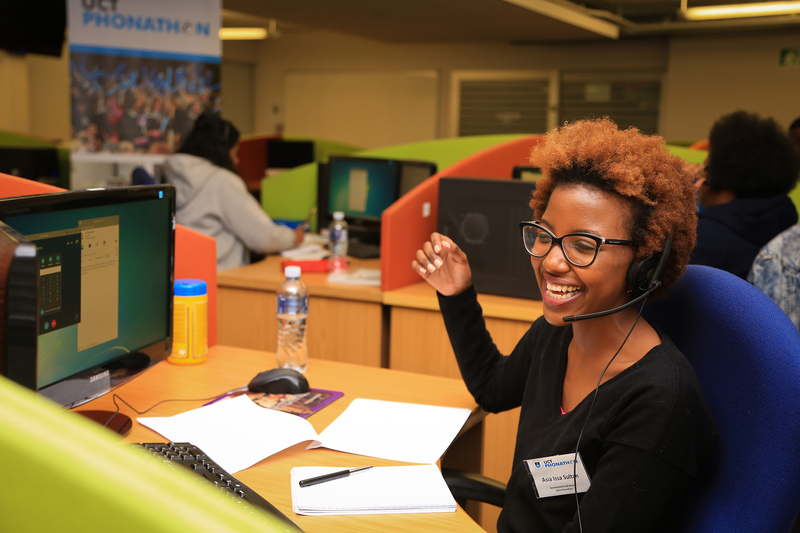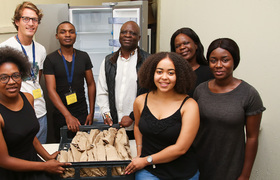Raising funds for campus food security
14 June 2019 | Story Niémah Davids. Photo Je’nine May. Read time 4 min.
It’s that time of year again; the University of Cape Town’s (UCT) annual phonathon is a few days away, and students are gearing up to let their fingers do the walking, with alumni contact numbers on speed dial.
Organised by UCT’s Development and Alumni Department (DAD), in partnership with Information and Communication Technology Services (ICTS), the phonathon relies strictly on the generous support of alumni to raise essential funds for various on-campus initiatives.
This year, the campaign aims to raise in excess of R1 million for the 2020 Food Security Programme, a special initiative launched during the November 2018 exam season to address the issue of student hunger on campus.
“This year our monetary target is more ambitious than in previous years, given the urgency of the programme we are raising funds for,” explained Yusuf Omar, DAD communications manager.
A worthy cause
Currently, the Food Security Programme feeds 600 students every weekday on campus. Meals are pre-packed and delivered to UCT campuses by the Food Connect Service.
But according to Edwina Brooks, director of the Student Development Cluster in the Department of Student Affairs, as of 2020 students will instead receive a voucher. Vouchers will be redeemable at Food Connect outlets on campus.
She said the voucher option opens students up to a range of lunchtime choices, and “removes the indignity of appearing to receive a handout”.
“Student hunger is hidden and stigmatised. Our response aims to eliminate that stigma, and instead promote students’ dignity.”
With 80 teaching and exam days in 2020, the phonathon aims to raise at least R1 536 000 to cover the programme’s annual costs.
“Student hunger is hidden and stigmatised. Our response aims to eliminate that stigma, and instead promote students’ dignity … and the ability to broaden their minds without fretting about their next meal,” Brooks said.
A small ask
The 2019 campaign kicks off on Tuesday, 18 June, and runs till 13 July. With the first semester fully wrapped up by then, and the mid-year vacation in full swing, a group of students has volunteered to stick around to participate in the initiative.
But their phone calls will be anything but cold calling. Instead, the institution has already contacted its alumni database via email to alert them to expect the students to call seeking contributions “to their alma mater”.
Only alumni who have agreed to participate will be contacted.
“While there is a clear fundraising aspect attached to the phonathon, much of the return on investment comes in the form of cultivating an engaged and interested alumni cohort,” Omar said.
He pointed out that in the past students have engaged well with alumni on matters concerning the university, with some receiving career guidance, study tips and internship offers.
“The gain is mutual; the university benefits from its engaged and generous alumni, and the students get to connect with professionals in fields they might be considering.
“At the same time, the alumni receive new encouragement to maintain a conversation with UCT,” he added.
 This work is licensed under a Creative Commons Attribution-NoDerivatives 4.0 International License.
This work is licensed under a Creative Commons Attribution-NoDerivatives 4.0 International License.
Please view the republishing articles page for more information.










